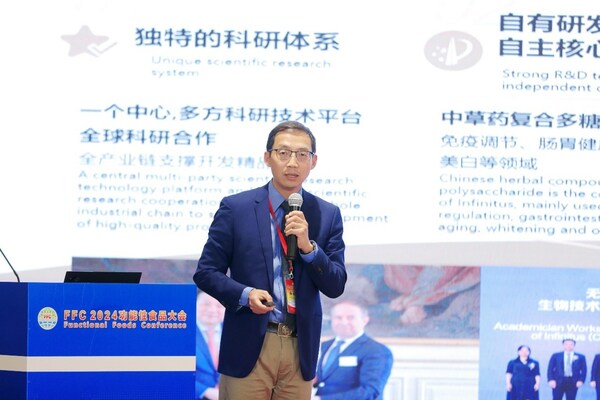预约演示
更新于:2025-08-29

Infinitus (China) Co., Ltd.
更新于:2025-08-29
概览
关联
2
项与 无限极(中国)有限公司 相关的临床试验ISRCTN18444252
Three combination probiotics for treatment of acute childhood diarrhea: an open labelled, randomized controlled trial
开始日期2017-05-01 |
申办/合作机构 |
ChiCTR-IOR-15006496
Efficacy and Safety of Yirui Capsules in Patients with Hyperlipidemia: A Multicenter, Randomized, Double-Blind, Placebo-Controlled Trial
开始日期2015-06-16 |
申办/合作机构 |
100 项与 无限极(中国)有限公司 相关的临床结果
登录后查看更多信息
0 项与 无限极(中国)有限公司 相关的专利(医药)
登录后查看更多信息
161
项与 无限极(中国)有限公司 相关的文献(医药)2025-11-01·FOOD CHEMISTRY
Curcumin-mediated photodynamic inactivation coupled with Cu2+-catalyzed Fenton-like reaction: a cascaded antifungal strategy against Fusarium graminearum and its applications
Article
作者: Chen, Lu ; Ou, Huajian ; Dong, Hao ; Dong, Shuliang ; Peng, Zhiyun ; Wang, Jing Jing ; Feng, Konglong ; Huang, Xiaowen ; Lu, Zhi ; Liu, Guang
A novel curcumin-mediated PDI coupled with Cu2+-catalyzed Fenton-like reaction was developed to explore its antifungal ability and mechanisms against Fusarium graminearum by analyzing ROS generation, cell membrane integrity, mitochondrial membrane potential (ΔΨm), spore germination and mycotoxin production. Results showed that this PDI could completely inactivate F. graminearum with 50 μM curcumin, 10.8 J/cm2 irradiation and 250 μg/mL CuCl₂. The potent mechanisms were attributed to the cytotoxic actions of Cu+ and •OH from Fenton-like reactions and cascaded redox reactions between Cu2+ and ROS generated by the PDI, which collectively damaged the cell membrane, degraded intracellular DNA and total proteins, disrupted ΔΨm and energy metabolism. Furthermore, this PDI significantly inhibited the spore germination of F. graminearum, suppressed the production of DON, reducing its contents to below the detection limit in maize and 0.17 μg/g in wheat. This study provides an efficient method to control fungal contaminations and their mycotoxins in food.
2025-09-01·INTERNATIONAL JOURNAL OF BIOLOGICAL MACROMOLECULES
Rational engineering design with computer-aided surface charge modulation of highly alkali-stable xylanase for sustainable green degumming applications in the textile industry
Article
作者: Zheng, Nan ; Zhou, Huimin ; Jin, Zhengyu ; Xia, Xiaole ; Du, Shuan ; Lu, Zhi ; Cai, Yongchao ; Wang, Yao ; Deng, Yu
The degumming process is vital for eco-friendly textile production, with β-1,4-endo-xylanase serving as the key hydrolase responsible for xylan degradation during this procedure. However, its limited resistance to alkali hampers the application due to reduced activity in alkaline environments. Herein, we employed the strategies for computer-aid high surface charged, to enhance resistance and activity of xylanase, generating the optimal mutant (Q130K/E195K) of 79 mutants, with improved 9.40 -fold (310.06 min) pH half-life and increased 2.55 -fold activity (714.54 U. mg-1) by WT (wild type). Moreover, molecular dynamics analysisy that positive changes in intermolecular interactions and surface charge for the improved catalytic activity of the best variant. Furthermore, treated with the optimal mutant for degumming, the fibers have less stickiness, better dispersion, and improved properties like strength, whiteness, and hydrophilicity. These finding expected provide theoretical guidance for the potential application of high-performance xylanase in green industry.
2025-07-01·BIOCHEMICAL AND BIOPHYSICAL RESEARCH COMMUNICATIONS
Madecassoside alleviates PM2.5-induced skin cell damage
Article
作者: Tai, Meiling ; He, Qiao ; Li, Wanzhao ; Ling, Xiao ; Li, Li ; Guo, Miaomiao ; Lv, Pingping
With accelerated urbanization, air pollution has become an environmental problem that requires urgent resolution. Intensified inflammation, atopic dermatitis, and itchy skin have been reported in humans exposed to increasing PM2.5 concentrations. PM2.5 is the particulate matter whose aerodynamic equivalent diameter is less than or equal to 2.5 μm in ambient air. Madecassoside, a pentacyclic triterpenoid active component, which is found in and extracted from the plant Centella Asiatica, possesses unique pharmacological properties, such as anti-inflammatory activity, which are used to treat skin wounds. This study investigated the effects of madecassoside in terms of pyroptosis antagonism, cell membrane repair promotion, and skin barrier repair using THP-1 and HaCaT cells stimulated with PM2.5. We measured IL-1β and LDH contents in culture supernatants of THP-1 cells. The expressions of the proteins related to cell membrane repair and skin barrier repair were detected by western blotting, quantitative reverse transcription PCR and immunofluorescence. We found that madecassoside reduced the release of the inflammatory factor IL-1β and the lytic cell death marker lactate dehydrogenase and repaired PM2.5-induced gasdermin D-mediated cell membrane damage. Further, madecassoside may have the potential to promote skin barrier repair by alleviating skin barrier-related protein damage and nuclear transfer. Therefore, madecassoside possesses anti-PM2.5 stimulating activity through repairing gasdermin D-mediated cell membrane damage and possibly protecting the skin barrier, indicating that madecassoside has good anti-inflammatory repair efficacy.
4
项与 无限极(中国)有限公司 相关的新闻(医药)2025-01-10
·美通社
广州
2025年1月10日
/美通社/ -- 近日,无限极全球年会上发布一则重磅消息:无限极(中国)有限公司成功获批 "国家重点研发计划" 政府间国际科技合作 ——《中英健康与衰老联合实验室》项目,这标志着无限极在国际化科研道路上迈出关键一步,实现了国家课题牵头的重大突破。
中英健康与衰老联合实验室正式启动
三方携手,实现企业在国家级课题牵头获批的重大突破
无限极是中草药健康产业的头部企业,融合东方养生智慧和现代方法,用中草药科技为延衰研究开辟了新路径;英国剑桥大学是全球顶尖学府,在生物学、遗传学等领域积累深厚,技术处于国际前沿地位;中国华南理工大学在食品科学、营养学等方面学术深厚,汇聚了专业的科研力量。三方强强携手,在延衰领域集中发力,推进中草药与现代方法融合的创新实践,为中医药的现代化和国际化进程提供有力支撑。
无限极此次牵头的项目获批,得益于多年在科研领域的深厚积累。自十年前无限极与剑桥大学、华南理工大学开启合作,便专注于延缓衰老领域研究,历经数年钻研,积累大量科研数据与成果,为项目申报奠定坚实基础。
2023 年 12 月,无限极牵头,联合两所高校向国家科技部提交 "国家重点研发计划" 项目申请,经过形式审查、专家答辩和两国政府磋商的层层审核,最终在2024年底成功获批!
国家级课题的申报竞争非常激烈,此次政府间国际合作的项目,总共设立了 12 个指南方向,支持中国与 16 个国家和地区开展科技合作。全国仅 35 个项目获批,企业牵头项目更是仅有 3 个,
而整个食品健康领域,只有无限极一家。
无限极成功突围,彰显其强大科研实力与持续投入科研的决心。
专家解读:项目意义深远
这一成果背后,专家们见解深刻。国家高层次人才计划入选者、华南理工大学食品科学与工程学院任娇艳教授称:"国家级课题申报竞争激烈,需过五关斩六将。
此次获批,不仅证明了无限极的硬实力,更与无限极多年来在科研方面的持续投入是分不开的
。在我看来,将科研成果转化为产品并推向市场,满足消费者的健康需求,才能真正体现科研的价值。"
剑桥大学化工与生物技术学院院长、剑桥无限极研究中心首席研究员克莱门斯•卡明斯基教授满怀期待地说:"剑桥大学有超过800年的历史,是全球顶尖的大学之一。无限极是中国领先的健康产品公司,也是全球顶尖的健康产品公司之一,我们是天然的合作伙伴。
和无限极合作中最有趣的就是汇聚东西方哲学思维来研究无限极产品中中草药成分的作用,正是这种协同为我们带来新的科学发现。
"
无限极(中国)有限公司副总裁、首席科创官马军先生分享:"
人类健康的需求不分国界,科学也不分国界,中草药更是中国送给世界人民的礼物
。‘中英健康与衰老联合实验室'正式启动,标志着中英在健康领域合作迈出关键一步。我们希望汇聚两国乃至全球的科研力量,通过这个中英政府间合作项目,结合中医理论和现代延衰靶点,打造更多具有差异化的延衰产品。"
聚焦延衰,展望未来
"中英健康与衰老联合实验室"的正式开启,不仅是对科学探索的一次重大推进,更是对全球人类健康与衰老的一次深度解锁。该平台将聚焦延缓衰老领域,打造差异化的延衰产品;发布国际青年学术开放基金,招募全球青年学者开展健康与衰老领域的研究,孵化具有商业化潜力的项目;同时,还会从专业实验室研究到产业应用开发的全链条支持,创建富有创新性的科研环境。
未来,无限极也将继续以健康养生理念作为指导原则,以用户为中心,在免疫、延衰、脾胃等领域持续发力,打造核心产品品牌"养固健",将"中草药科技"打造成无限极闪闪发光的名片,和消费者共创更健康、快乐的生活!
2024-04-16
·美通社
广州
2024年4月15日
/美通社/ -- 4月,
"
剑桥无限极研究中心-草本延衰研究计划启动仪式
"
圆满举行。剑桥大学化工与生物技术学院院长、剑桥无限极研究中心(简称CIRCE)首席研究员克莱门斯•卡明斯基教授、无限极(中国)有限公司副总裁、首席科创官马军先生、前沿技术研究总监李文治先生等嘉宾一同出席了此次活动。
剑桥无限极研究中心-草本延衰研究计划正式启动
圆满签约,项目启动
衰老是一个复杂的生物学过程,涉及多种分子、细胞和组织层面的变化。草本延衰研究计划将重点关注多个学术公认的衰老标志,结合剑桥大学先进的超分辨率成像、蛋白质组学/基因组学及AI等技术,对来源于中医经典方剂的无限极草本延衰产品组方及相关核心原料,开展抗衰老机制及可视化研究。
剑桥无限极研究中心
该计划的启动,标志着无限极将继续深耕延衰领域,为消费者开发出更多高品质的、可感知功效的中草药健康产品。
主题分享,学术交流
卡明斯基教授现场进行主题分享
卡明斯基教授作了《分子作用机制可视化》主题分享,介绍了CIRCE的重要研究成果,并分享了延缓衰老、神经退行性疾病以及与大脑健康等领域的最新前沿技术信息。
在随后的技术交流中,就如何利用剑桥的先进技术,开展无限极产品及核心原料的功效与作用机制研究进行了深入的探讨,以期为用户带来更大的价值。
剑桥大学卡明斯基教授参观无限极全球科研中心
卡明斯基教授在参观无限极全球科研中心时,对无限极注重科研投入、展现出的高专业度以及强大的创新性表示了高度的认可。
以用户为中心,基于信任的自主科研创新
无限极剑桥研究中心-草本延衰研究计划,旨在打造高品质的、消费者可感知功效的中草药健康产品。该计划的正式启动,充分展示了无限极在延衰领域的强大科研实力。
30多年以来,无限极始终致力于提升自身科研优势,积极与国内外知名高校及科研机构开展深入合作,不断拓宽科研视野,增强研发实力。未来,无限极将继续秉承弘扬中华优秀养生文化的使命,深耕"健康养生"主赛道,坚持以用户为中心,建立差异化的科研路径,为消费者提供更多高品质的中草药健康产品,与大家共创更健康、更快乐的生活!
2024-04-01
·美通社
广州
2024年4月1日
/美通社/ -- 3月29日-31日,FFC 2024国际功能性食品大会在山东青岛隆重召开。本次大会以“功能食品与人类健康”为主题,来自业内的顶级专家、龙头企业等功能食品界代表齐聚一堂,共议科技创新、产品创新、市场趋势、政策标准等。无限极(中国)有限公司受邀出席大会,首席科创官马军先生代表公司作主题分享。
“FFC功能性食品大会”已连续召开14届,是国内唯一聚焦“功能性食品”的专业会议。大会搭建管理、科研、原料、终端、OEM、装备、经销商等全产业链交流和对接平台,打造功能食品产业生态链,解决功能食品发展全过程问题,是具有我国功能食品产业发展风向标、信息面宽且产业链长等特点的品牌会议,引领我国功能性食品产业高质量发展。
无限极(中国)有限公司首席科创官马军先生分享
会上,马军先生作了《药食同源复合多糖多维度药理活性及应用技术研究》的主题分享,展示了多糖对人体的多种健康功能,并重点介绍了无限极在复合多糖免疫领域及肠胃健康领域的技术研究进展和成果。
以复合多糖在免疫领域的技术研究为例,无限极研发团队从消费者需求出发,通过使用无限极创新建立的免疫力评价模型发现由香菇多糖、银耳多糖与茯苓多糖复配而成的复合多糖能显著激活免疫。此外,无限极还进一步深入研究发现该复合多糖有助于提高流感疫苗的免疫保护功效,研究成果已在国际权威学术期刊《Food and Agricultural Immunology》上发表并获得欧洲专利授权。目前,以上研究成果已成功应用于产品开发中。无限极在复合多糖免疫领域的领先技术优势获得了与会嘉宾的一致认可。
未来,无限极将继续提高自身研发实力,积极参与行业会议,促进行业高质量发展的同时,以用户为中心,持续探索复合多糖新领域,加强与国内外科研机构的合作与交流,不断推进复合多糖技术创新,提高其在产品中的应用效果,为广大消费者提供更多高品质、值得信任的中草药健康产品,共创更健康、更快乐的生活!

疫苗
100 项与 无限极(中国)有限公司 相关的药物交易
登录后查看更多信息
100 项与 无限极(中国)有限公司 相关的转化医学
登录后查看更多信息
组织架构
使用我们的机构树数据加速您的研究。
登录
或

管线布局
2026年02月08日管线快照
无数据报导
登录后保持更新
药物交易
使用我们的药物交易数据加速您的研究。
登录
或

转化医学
使用我们的转化医学数据加速您的研究。
登录
或

营收
使用 Synapse 探索超过 36 万个组织的财务状况。
登录
或

科研基金(NIH)
访问超过 200 万项资助和基金信息,以提升您的研究之旅。
登录
或

投资
深入了解从初创企业到成熟企业的最新公司投资动态。
登录
或

融资
发掘融资趋势以验证和推进您的投资机会。
登录
或

生物医药百科问答
全新生物医药AI Agent 覆盖科研全链路,让突破性发现快人一步
立即开始免费试用!
智慧芽新药情报库是智慧芽专为生命科学人士构建的基于AI的创新药情报平台,助您全方位提升您的研发与决策效率。
立即开始数据试用!
智慧芽新药库数据也通过智慧芽数据服务平台,以API或者数据包形式对外开放,助您更加充分利用智慧芽新药情报信息。
生物序列数据库
生物药研发创新
免费使用
化学结构数据库
小分子化药研发创新
免费使用